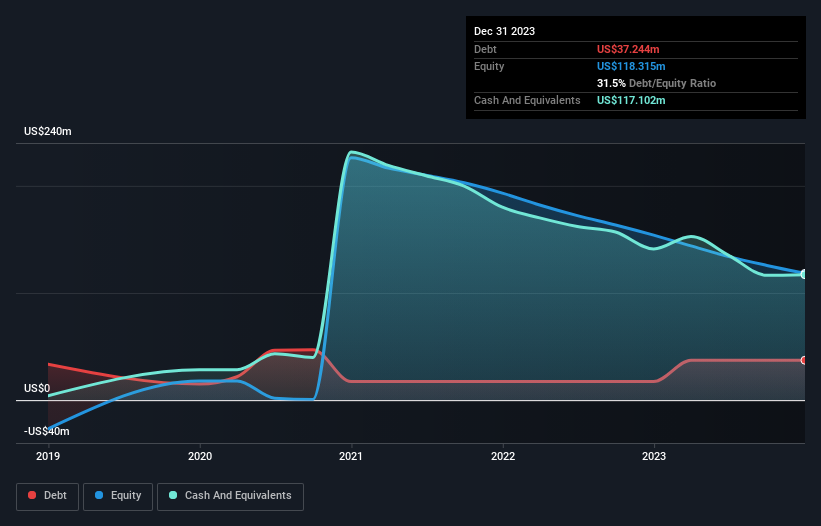- United States
- /
- Medical Equipment
- /
- NasdaqGS:LUNG
Pulmonx (NASDAQ:LUNG) Has Debt But No Earnings; Should You Worry?
Some say volatility, rather than debt, is the best way to think about risk as an investor, but Warren Buffett famously said that 'Volatility is far from synonymous with risk.' It's only natural to consider a company's balance sheet when you examine how risky it is, since debt is often involved when a business collapses. As with many other companies Pulmonx Corporation (NASDAQ:LUNG) makes use of debt. But is this debt a concern to shareholders?
What Risk Does Debt Bring?
Generally speaking, debt only becomes a real problem when a company can't easily pay it off, either by raising capital or with its own cash flow. Part and parcel of capitalism is the process of 'creative destruction' where failed businesses are mercilessly liquidated by their bankers. However, a more usual (but still expensive) situation is where a company must dilute shareholders at a cheap share price simply to get debt under control. Of course, debt can be an important tool in businesses, particularly capital heavy businesses. When we think about a company's use of debt, we first look at cash and debt together.
View our latest analysis for Pulmonx
What Is Pulmonx's Debt?
As you can see below, at the end of December 2023, Pulmonx had US$37.2m of debt, up from US$17.3m a year ago. Click the image for more detail. However, it does have US$117.1m in cash offsetting this, leading to net cash of US$79.9m.

A Look At Pulmonx's Liabilities
According to the last reported balance sheet, Pulmonx had liabilities of US$23.2m due within 12 months, and liabilities of US$36.3m due beyond 12 months. On the other hand, it had cash of US$117.1m and US$12.1m worth of receivables due within a year. So it actually has US$69.7m more liquid assets than total liabilities.
This short term liquidity is a sign that Pulmonx could probably pay off its debt with ease, as its balance sheet is far from stretched. Succinctly put, Pulmonx boasts net cash, so it's fair to say it does not have a heavy debt load! When analysing debt levels, the balance sheet is the obvious place to start. But ultimately the future profitability of the business will decide if Pulmonx can strengthen its balance sheet over time. So if you're focused on the future you can check out this free report showing analyst profit forecasts.
Over 12 months, Pulmonx reported revenue of US$69m, which is a gain of 28%, although it did not report any earnings before interest and tax. With any luck the company will be able to grow its way to profitability.
So How Risky Is Pulmonx?
We have no doubt that loss making companies are, in general, riskier than profitable ones. And in the last year Pulmonx had an earnings before interest and tax (EBIT) loss, truth be told. Indeed, in that time it burnt through US$40m of cash and made a loss of US$61m. While this does make the company a bit risky, it's important to remember it has net cash of US$79.9m. That kitty means the company can keep spending for growth for at least two years, at current rates. Pulmonx's revenue growth shone bright over the last year, so it may well be in a position to turn a profit in due course. By investing before those profits, shareholders take on more risk in the hope of bigger rewards. When analysing debt levels, the balance sheet is the obvious place to start. But ultimately, every company can contain risks that exist outside of the balance sheet. For instance, we've identified 3 warning signs for Pulmonx that you should be aware of.
If you're interested in investing in businesses that can grow profits without the burden of debt, then check out this free list of growing businesses that have net cash on the balance sheet.
New: Manage All Your Stock Portfolios in One Place
We've created the ultimate portfolio companion for stock investors, and it's free.
• Connect an unlimited number of Portfolios and see your total in one currency
• Be alerted to new Warning Signs or Risks via email or mobile
• Track the Fair Value of your stocks
Have feedback on this article? Concerned about the content? Get in touch with us directly. Alternatively, email editorial-team (at) simplywallst.com.
This article by Simply Wall St is general in nature. We provide commentary based on historical data and analyst forecasts only using an unbiased methodology and our articles are not intended to be financial advice. It does not constitute a recommendation to buy or sell any stock, and does not take account of your objectives, or your financial situation. We aim to bring you long-term focused analysis driven by fundamental data. Note that our analysis may not factor in the latest price-sensitive company announcements or qualitative material. Simply Wall St has no position in any stocks mentioned.
About NasdaqGS:LUNG
Pulmonx
A commercial-stage medical technology company that provides a minimally invasive treatment for patients with severe emphysema, a form of chronic obstructive pulmonary disease.
Flawless balance sheet and fair value.
Similar Companies
Market Insights
Weekly Picks


Crazy Undervalued 42 Baggers Silver Play (Active & Running Mine)


Fiducian: Compliance Clouds or Value Opportunity?

Willamette Valley Vineyards (WVVI): Not-So-Great Value
Recently Updated Narratives


ADNOC Gas future shines with a 21.4% revenue surge

Watch Pulse Seismic Outperform with 13.6% Revenue Growth in the Coming Years

Significantly undervalued gold explorer in Timmins, finally getting traction
Popular Narratives


MicroVision will explode future revenue by 380.37% with a vision towards success


NVDA: Expanding AI Demand Will Drive Major Data Center Investments Through 2026





